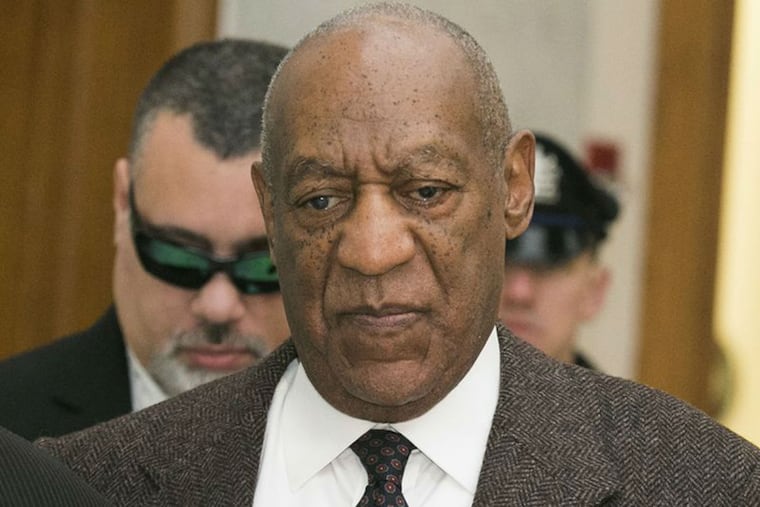Pennsylvania Supreme Court agrees to consider Bill Cosby’s bid to overturn his sex-assault conviction
Specifically, the court said it was interested in the decision by the judge overseeing the case to allow prosecutors to call as witnesses five other accusers and Cosby's claims he made a deal with a prior district attorney that barred him from being prosecuted at all.

The Pennsylvania Supreme Court agreed Tuesday to review Bill Cosby’s 2018 sexual-assault conviction, delivering the 82-year-old comedian a long-sought opportunity to try to persuade the appellate court to overturn the outcome of his case.
Specifically, the court said it was interested in the decision by the Montgomery County judge who oversaw the case to allow prosecutors to call as witnesses five women whose allegations fell outside the statute of limitations but whose testimony was meant to bolster the account of Cosby’s central accuser, Andrea Constand.
The justices also said they would consider arguments by Cosby’s lawyers that he never should have been prosecuted. He maintains that a 2005 deal he struck with a prior district attorney — never put in writing — should have barred Montgomery County District Attorney Kevin R. Steele from charging him in 2015.
Those issues have been at the heart of Cosby’s case — which has proceeded through two jury trials, countless motions, and several earlier stops at the state’s appellate courts — since the beginning. Should the justices issue a precedential ruling, especially on the issue of the other witnesses, it could bolster or diminish Pennsylvania laws that have enabled several prosecutions of serial sexual abusers in the #MeToo era.
A date was not immediately set for a hearing.
Since Cosby was convicted two years ago for assaulting Constand in 2004, his defenders have taken a two-pronged approach to try to undercut the verdict that ended in a three-to-10-year prison sentence.
His lawyers have sought appellate review — first from Superior Court, which rejected Cosby’s appeal, then the Supreme Court — while his publicist and his wife have worked to link the case to larger national debates about racial disparities within the justice system. Camille Cosby has referred to his trial as a “public lynching” and likened her husband’s plight to those of Nelson Mandela and Jesus.
“We are extremely thankful to the state Supreme Court of Pennsylvania for agreeing to review Mr. Cosby’s appeal,” his spokesperson, Andrew Wyatt, said in a statement Tuesday. “The false conviction of Bill Cosby is so much bigger than him — it’s about the destruction of ALL Black people and people of color in America.”
Little of that rhetoric is expected to make its way before the Supreme Court. Instead, the testimony from the five other women will likely take the forefront. All testified at trial that they were drugged and assaulted by Cosby during encounters dating back to the 1970s.
Prosecutors introduced their testimony under laws that permit jurors to hear evidence of what are known as “prior bad acts” to establish that a defendant has a common method of committing crimes like the one at the heart of a case. Similar laws were used to secure the rape conviction this year of movie mogul Harvey Weinstein.
Cosby has repeatedly argued that the women allowed to testify in his case unfairly prejudiced the jury against him and that those accusers’ claims were too old and vague for him to rebut.
He also disputed prosecutors’ decision to introduce at trial a deposition he had given in a civil suit Constand filed against him in 2005, saying he only agreed to sit for it under the understanding he would never be prosecuted for allegedly assaulting her. In it, he testified about past sexual encounters with women whom he had offered drugs.
That belief stems from an agreement his lawyers say he struck with then-District Attorney Bruce L. Castor Jr. that same year — one that Castor has testified he made in the hope of compelling Cosby’s testimony and helping Constand’s civil case.
Montgomery County Judge Steven T. O’Neill rejected that argument at several points throughout the legal proceedings, concluding that Castor was not a credible witness and that he didn’t have the authority to promise that his successors would never prosecute Cosby.
The Supreme Court rejected the same argument in 2016, when Cosby deployed it in an attempt to stop his trial before it started.
Steele said he and his office “look forward to briefing and arguing these issues and remain confident in the trial court and Superior Court’s previous decisions.”
Constand, in a statement, said she was hopeful the Supreme Court would not let Cosby’s wealth and fame influence its decision.
”While everyone deserves for their cries and appeals to be heard, even convicted criminals, if anyone’s cries matter most right now, it’s the women who have lifted their voices and selflessly put themselves in harm’s way,” she said, citing the other women who testified against Cosby. “They are the true heroes ... We all deserve justice.”
Cosby remains imprisoned at SCI Phoenix in Eagleville for drugging and assaulting Constand, a former operations manager for the Temple University women’s basketball team. He maintains their sexual encounter was consensual and has vowed he will not express remorse for something he did not do when he applies for parole.
>>Read the Pennsylvania Supreme Court order: